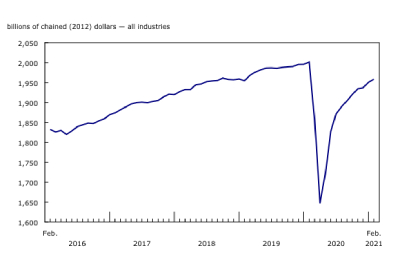Canadian GDP by Industry, February 2021

May 4, 2021
Real gross domestic product (GDP) grew 0.4% in February, following 0.7% growth in January. This 10th consecutive monthly increase continued to offset the steepest drops on record in Canadian economic activity observed in March and April 2020. However, total economic activity was about 2% below the level observed in February 2020, before the COVID-19 pandemic.
Services-producing industries were up 0.6%, while goods-producing industries contracted (-0.2%) for the first time since April. Overall, 14 of the 20 industrial sectors expanded in February.
Preliminary information indicates an approximate 0.9% increase in real GDP for March. Manufacturing, retail trade, and finance and insurance contributed to the gain, while mining, quarrying, and oil and gas extraction offset some of the growth. This advance estimate points to an approximate 1.6% increase in real GDP in the first quarter of 2021. Owing to their preliminary nature, these estimates will be revised on June 1 with the release of the official GDP data for the March reference month and the first quarter of 2021.
Retail trade rebounds
Retail trade activity jumped 4.5% in February, following two months of decreases, as 10 of the 12 subsectors were up. In February, many provinces lifted or eased the lockdown measures that had largely contributed to the sector’s declines in December and January. Stores more dependent on in-store traffic experienced the largest rebound in activity.
Clothing and clothing accessories stores (+23.5%), sporting goods, hobby, book and music stores (+28.8%), and furniture and home furnishings stores (+11.7%) saw double-digit increases in activity. Motor vehicle and parts dealers were also up strongly (+4.9%), led by higher activity at new car dealers and at automotive parts, accessories and tire stores.
General merchandise stores grew 6.0%, while building material and garden equipment and supplies dealers were up 3.5%, benefiting from continued growth in home alteration and improvement activity. Non-store retailers increased for the fourth month in a row, growing 0.5% in February.
Construction grows
Construction rose 2.0% in February, building on increases in the previous two months, as all subsectors were up. Residential building construction jumped 4.7% as all types of construction recorded growth, led by home alterations and improvements and by single-family home construction. Repair (+0.5%), engineering and other construction activities (+0.2%), and non-residential building construction (+0.3%) were all up in February.
First decline in mining, quarrying, and oil and gas extraction in six months
Mining, quarrying, and oil and gas extraction declined 2.8% in February as two of the three subsectors contracted.
Oil and gas extraction decreased 3.9% in February following five consecutive months of growth. Oil sands extraction (-4.8%) was down for the first time in six months as lower crude bitumen and synthetic oil production in Alberta contributed to the decline in February. Oil and gas extraction (except oil sands) decreased 2.8% as crude petroleum extraction was down across the country, with notable declines at Newfoundland and Labrador offshore production facilities.
Following three months of growth, mining and quarrying (except oil and gas) declined 2.7% in February as all subsectors were down. Metal ore mining decreased 3.1%, as copper, nickel, lead and zinc ore mining (-6.4%), iron ore mining (-1.9%), and other metal ore mining (-16.8%) all contributed to the decline. International demand for these commodities was down in February.
In contrast, support activities for mining, and oil and gas extraction grew 3.5% in February, led by higher drilling and rigging services.
Manufacturing contracts
The manufacturing sector contracted 0.9% in February, following 1.5% growth in January, continuing the sequence of increases alternating with small declines seen since September 2020. Both durable and non-durable manufacturing were down in February.
Durable manufacturing decreased 0.9% in February, following 2.2% growth in January, on declines largely concentrated in transportation equipment. The transportation equipment manufacturing subsector declined 4.2% as a global semiconductor shortage contributed to production disruptions in motor vehicle (-5.2%) and motor vehicle parts (-11.0%) manufacturing.
Non-durable manufacturing decreased 1.0% in February as four of the nine subsectors were down. Contributing the most to the decline was plastics and rubber products manufacturing (-6.6%), as lower demand from motor vehicle and motor vehicle parts manufacturers partially contributed to the decrease. Food manufacturing was down 1.7%, with meat product manufacturing (-9.7%) contributing the most to the decline, as a number of processing plants dealt with temporary closures because of COVID-19. Printing and related support activities (+8.7%), beverage and tobacco product manufacturing (+2.2%), and chemical manufacturing (+0.3%) offset some of the decrease.
Professional services keep growing
Professional services expanded 1.2% in February as all industries were up. Contributing the most to the gains were computer systems design and related services (+1.2%) and other professional, scientific and technical services, including scientific research and development (+1.2%).
Legal services, which derive much of their activity from real estate transactions, grew 1.6% in February. An increase in home resale activity in and around the Greater Toronto Area and continued strength in Western Canadian centres pushed the level of activity at offices of real estate agents and brokers (+3.4%) to yet another all-time high.
The public sector continues to grow
The public sector (educational services, health care and social assistance, and public administration) grew 0.6% in February, as all three components were up. Health care and social assistance rose 1.1%, led by ambulatory health care services (+2.5%). The educational services sector was up 0.5%, as elementary and secondary schools, along with universities, increased. Public administration grew 0.1% as a decline in municipal government services was more than offset by increases in federal and provincial and territorial government services.
Other industries
Accommodation and food services grew 3.5% in February, following five consecutive months of decline. Growth was led by a 4.0% increase in food services and drinking places, which benefited from eased restrictions across many provinces.
Transportation declined 2.0% as a majority of industries were down. Support activities for transportation (-4.5%), air transportation (-35.3%) and rail transportation (-3.8%) contributed the most to the decline. Transit, ground passenger, and scenic and sightseeing transportation (+8.0%), pipeline transportation (+0.6%), and warehousing and storage (+0.8%) were up.
Wholesale trade declined 1.0% in February, partly offsetting a 3.7% increase in January, as six of the nine subsectors were down. Contributing the most to the decrease in February were building material and supplies wholesaling (-6.8%) and machinery, equipment and supplies wholesaling (-0.7%), which had strong increases the month before. Miscellaneous wholesaling (+3.1%) and personal and household goods wholesaling (+1.1%) offset some of the declines.
Finance and insurance grew 0.4%, as credit intermediation and monetary authorities (+0.2%), financial investment services, funds and other financial vehicles (+0.9%), and insurance carriers and related activities (+0.4%) rose.
Utilities grew 1.3% in February, as electric power generation, transmission and distribution (+1.1%), natural gas distribution (+2.9%), and water, sewage and other systems (+0.9%) all increased.











